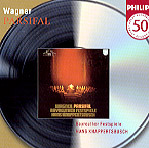Remastered for Philips’ 50 Great Recordings series, the orchestral image in Hans Knappertsbusch’s 1962 Bayreuth Parsifal seems brighter, more forward than before, and I detect more color and presence to the voices. As a result, the stage noises gain amplitude along with a tiny buzz in the original recording. The latter is chiefly noticeable in the music’s frequent soft passages, but it doesn’t detract from the music. In contrast to the many “unofficial” mono Knappertsbusch Bayreuth broadcasts on the market, Philips’ “official” stereo engineering reveals how full and luminous Kna’s orchestra could sound when unleashed at full throttle in the Festspielehaus acoustic. It would have been possible, though, for Philips to include Acts 2 and 3 on their own separate discs, with the long Act 1 by itself, spread across two CDs.
Knappertsbusch’s lyrical, fluid conducting radically differs from his slower, heavier 1951 Bayreuth Parsifal (Teldec), even though I prefer some of the earlier version’s casting choices, like Martha Mödl’s Kundry and Wolfgang Windgassen in the title role. Here Irene Dalis and Jess Thomas sing beautifully but tend to stand outside the drama in contrast to their predecessors. However, Hans Hotter’s riveting, gloriously detailed Gurnemanz reveals new subtleties with each rehearing, George London’s Amfortas improves upon his 1951 reading for Kna, and Gustav Neidlinger’s malevolently projected Klingsor ups Act 2’s expressive stakes by a country mile. It’s not a perfect Parsifal by any means, but it’s surely the best-engineered and most cleanly executed example on disc of Knappertsbusch conducting Wagner in the theater. Full texts and translations are included.
































